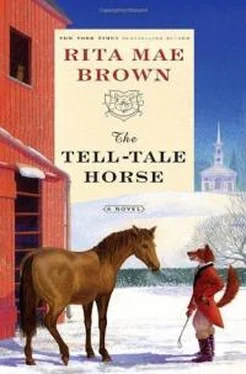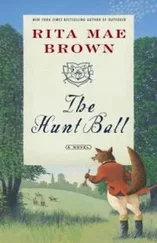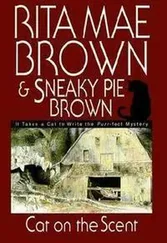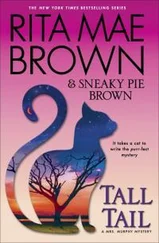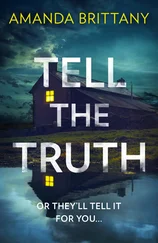Aztec, a bit younger than her other hunters, did need more attention, so as he launched smoothly over the first coop she clucked when he landed, giving him a hard squeeze, hands forward, and if he thought to hesitate he gave no sign of it. He took the second coop a little big; she lost her right stirrup iron on the muddy landing. No matter. Foxhunters learn to pick up stirrup irons on the run, and it’s a poor trainer who doesn’t teach his or her charges such valuable lessons. This isn’t dressage at Devon. This is survival. Ride without if you must.
Fishing for the stirrup iron longer than she would have wished, Sister finally slipped her boot into it—couldn’t feel her toes anyway—and turned her head for a moment to see how her field was negotiating the bounce jump.
Ilona Merriman, riding a half-Thoroughbred half-warmblood mix, hit it perfectly. Behind her, Cabel Harper bobbled on the second jump but hung on, laughing when she righted herself. Saturdays their husbands hunted too. Good thing this was a Tuesday, because neither Ramsey nor Clayton were good riders. Chances are the bounce jump would have unhorsed them.
Interesting as the sight was, Sister turned away from the spectacle as hounds now roared like an organ, full throttle.
The pack ran close together, Cora and Dragon fighting for the lead, Diana, anchor hound, steady in the middle front. If hounds overran the line, Diana usually brought them back. If she failed, the tail hounds, older, a touch slower but very wise, called the pack back to rights. All young entry—Peanut and Parson of the P litter, Ammo and Allie of the A litter—acquitted themselves with honor.
No overrunning today for this young red. Tricks exhausted, or too young to know more, he now flew for all he was worth. Well, he sure was worth a great run. Fifteen minutes later, the pack dug into his den behind the tidy Episcopal Church at Chapel Cross. Shaker dismounted, blew “Gone to Ground,” and got back up. He couldn’t feel his feet either. It was a happy huntsman that turned for home. Sister, too, felt exhilarated at how beautifully her hounds had worked.
Wind at their backs made the twenty-minute ride a trifle more pleasant. Close to Tattenhall Station, the tertiary state road, stone and crushed stone now mud, made the going slower.
A field master can ride in front alone when the hunt is done or allow people to come up and chat. Three years ago, an old lover of Sister’s, who had long become a precious friend, passed away. She and Peter Wheeler had so often ridden back together that she’d spent the first half of the season after his death holding back her tears and riding alone. She’d gotten herself together a bit by the second half and begun chatting with folks again on the ride home. She could now remember Peter with warmth and gratitude for his gifts to her.
Today Tedi, Edward, and Gray all came alongside.
Bunny Taliaferro, riding coach at Custis Hall, rode right behind. Anne “Tootie” Harris, Val Smith, Felicity Porter, and Pamela Rene, all students, had earned the privilege to go out with Jefferson Hunt. After each ride they were required to write about their experiences, bringing in geography, topography, plants, animals, weather conditions, and history. They’d be able to fill pages today, since Tattenhall Station mirrored the history of America’s railroads, particularly the spur lines.
Back at the trailers, most people checked their horses, removed bridles and martingales, took off saddles, and threw rugs in their stable colors over their horses’ backs. Sister loosened the girth of her saddle but didn’t take it off. She worried about the cold on that big sweaty spot even with a nice heavy blanket on the horse.
Tootie came up. “Master, Val’s taking care of Iota”—she named her horse—“so I can take care of Aztec.”
Sister handed her Aztec’s bridle, squeezing Tootie’s shoulder. She just loved this kid. “Thanks, honey.”
Jennifer Schneider, a new member, already had the table set up, and people brought their dishes to it. Jefferson Hunt tailgates flourished in sleet, snow, or rain. Occasionally they had the use of a building, but no matter what this group could eat.
High Vajay, talking to Garvey Stokes, owner of Aluminum Manufacturing, nodded when Sister approached them.
“Master, what a wonderful hunt. Thank you.” High’s manners added to his considerable appeal. “I want you to have a chance to talk to my college friend. Once Garvey and I resolve the economy, I’ll bring Kasmir to you.”
Sister didn’t even try to untangle the caste system of India, but she knew whatever High was it was at the top. He’d started out in the diplomatic service but quickly realized he’d be at the whim of changing administrations, so he took a job at Craig and Abrams, a large multilayered electronics corporation. Intelligent and driven, he had steered his division toward wireless phones twenty years ago and retired at forty-five. He’d learned to love Virginia when working in Washington, D.C., for half a year for the company. He’d vowed to return, and two years ago, a free man, he did. Once nestled in the Blue Ridge foothills, none of the Vajays ever looked back.
“How are you doing?” Garvey took Sister’s gloved hand in his.
She’d been his master when he was a child, and earlier this year she had helped him through a dreadful time. He thought of her as a second mother but wisely did not say so. Most women in the company of handsome younger men do not wish to be considered motherly.
“I’m all right, but what a jolt.”
“How’s Marion?” High inquired.
“Watchful but okay. Obviously, we’re all worried for her. The sheriff still doesn’t know who the woman is—I mean, was.”
“He’s thorough. He called my wife and then me. I guess he figured anyone from India would know someone else from India.”
“Doesn’t India have over a billion people?” Garvey asked, his thick eyebrows rising upward. “And six million of them have AIDS?”
“True.” High couldn’t resist reaching for a tiny cinnamon bun, although he resisted commenting on the AIDS explosion, which could undermine, in time, much of India’s recent gains. “But that wasn’t as naïve as it might seem, because expatriates in any country often find one another. He e-mailed me photos. I didn’t recognize her.”
“It’s possible she’s an American citizen of Indian descent,” Sister opined.
Garvey smiled. “We have everything here.”
“You have us.” High slapped him on the back.
Valentina and Felicity waited for Sister to leave the men.
“Girls.”
“No one fell off. With this footing. A miracle.” Val got to the point, part of her direct character. “No bottles.”
If someone came off, a bottle was owed to the club.
As senior class president, the tall lovely blonde exuded a natural air of authority. She was one inch taller than Sister, which made Sister smile, since rarely was she topped by another woman.
“You didn’t get one bottle.” Felicity smiled shyly, a young lady of unforced reserve yet warm.
“I know, and the bar is getting low.”
“If we come off you only get a six-pack of soda.” Val turned. “Here comes the African queen.”
She teased Tootie, diminutive at five foot four and lavishly gorgeous. Tootie was African-American, hence “African queen.” Tootie was high yellow, a term only old folks, black and white, would have used. Tootie’s skin, creamy, shimmering like light café au lait, signified someone of high blood from way back. Tootie didn’t give a damn about any of that in any case; her generation hadn’t suffered from racism to the degree that their parents had. Good as this was, it didn’t mean there wasn’t a reservoir of stupidity out there for which these youngsters were often unprepared.
Читать дальше
